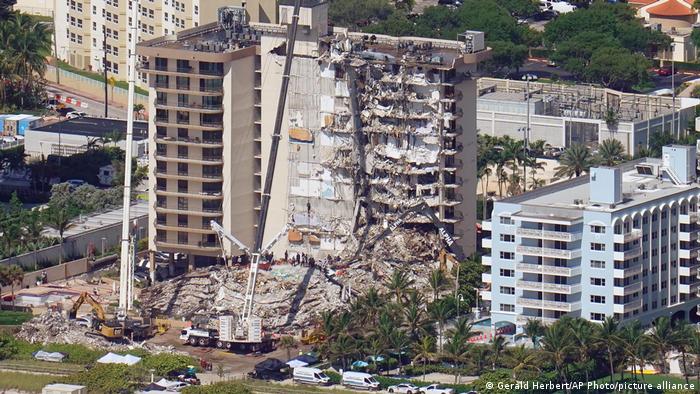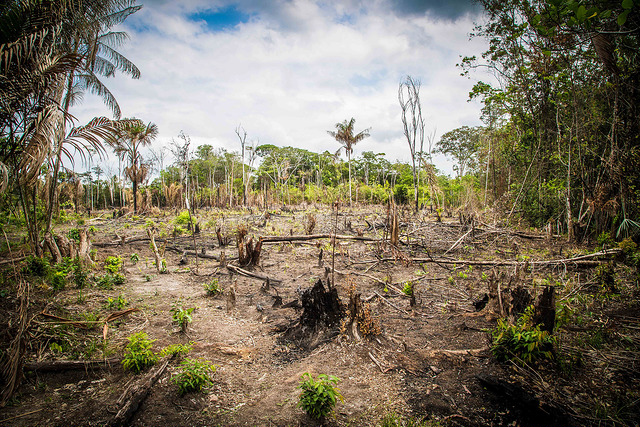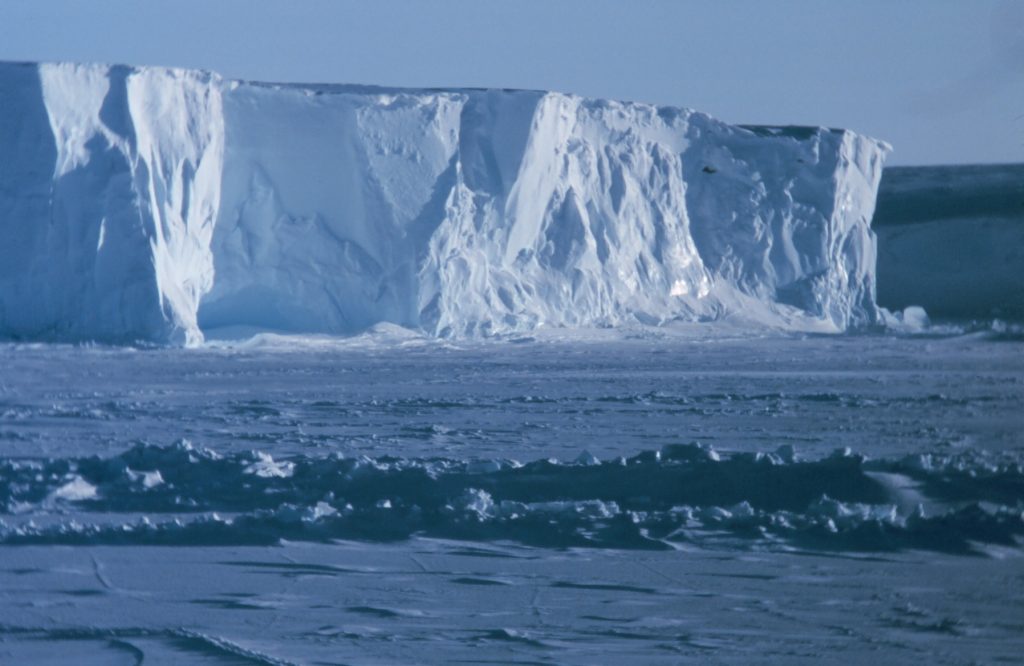Reimagining a just society pt. 6: Our planetary condominium

Champlain Towers South in Surfside, Florida after the collapse on June 24, 2021 (Image: Source)
On June 24, 2021, two out of three condominium towers of Champlain Towers South collapsed in less than eleven seconds. Soundless surveillance video taken from a nearby building revealed cement and steel silently cascading into billowing clouds of dust. What looked like a controlled demolition of a building was anything but planned or normal.
In fact, engineers with years of experience were as shocked as the general public by the event. The unprecedented collapse took the lives of 98 people, including one victim who died in a hospital shortly after the collapse.
As the rescue effort continued into a second week, speculation as to the cause(s) of such a colossal structural failure was rampant. Questions of accountability and liability for the disaster arose amid proliferating stories of those most impacted by the condominium’s collapse. Some focused on the condominium’s shared ownership and questions of its responsibility and ability to act in time to head off such a disaster.
It’s generally well-known that “condominium”, a word with Latin roots, means joint- or co-ownership. Residents in a typical condominium are responsible for their individual units and share the use of common areas which are managed through an association often known as a “homeowners association” or a condominium association. In the concept of common areas is the principle of shared responsibility for their upkeep by individual owners who benefit from collective efforts that ensure regular maintenance of the whole. Occasionally, however, the extent of needed repairs can outstrip the ability or willingness of residents to pay for them. And in a “mini-democracy” such as a typical homeowners association, such disagreement can delay action until costs become prohibitively high or prospective action comes too late. In some cases, moreover, concerns and potential remedies may be outside the purview and ability of homeowners’ associations to manage.
Many people have experience with these associations and may live in condominium arrangements themselves. Until now, however, how many would ever consider the risk of the “whole” — of which personal property and individual lives are integral parts — collapsing? Do people in these residential arrangements typically consider the quality of the rebar or other interdependent elements, such as concrete support pillars, as part of the common area over which they have joint ownership? Would they ask whether the legal structures that make up a condominium agreement anticipate the need to protect the whole from total collapse? News media have reported on multiple structural issues, including factors surrounding but not integral to the complex — such as nearby construction activity and the building’s exposure to saltwater — that may have played a role in the collapse though a definitive conclusion about its cause(s) is likely months away.
The Endangered Global Commons
Without diminishing the tragedy of the condominium collapse, it’s possible to view this disaster as an analogy for humankind’s challenges in reaching agreement on whether and how to value the “commons,” sometimes also known as public goods, on which all life, and not just human life, depends. “Commons” are “resource domains in which common-pool resources are found.” (They can be as small as the parking lot for an apartment complex, according to Dr. Susan Buck, editor of The Global Commons: An Introduction, or as large as the high seas or the solar system.) Whether in an apartment condominium or on a planetary scale, the “commons” refer to areas outside of privately owned assets that are essential to their functioning and value, such as the rebar-reinforced concrete. And just as Florida condominium’s sudden collapse astounded engineering experts, the speed with which critical Earth life support systems are disintegrating and even collapsing is shocking scientists around the world. In general, environmental changes have been unprecedentedly rapid when they are considered on a geological time scale. In other words, environmental changes that once unfolded over thousands of years are now happening at an accelerated pace with implications for humankind’s future as well as that of all living species.
Consider that a span of 200,000 years is a blink of an eye in geological time — as the “The Last Time the Earth Warmed” drives home to viewers — and it’s easy to see why many people who view today’s changes within more familiar time scales, such as the span of recorded history, are frequently caught by surprise. This pattern of frequent scientific surprise has its roots in the fact that observed environmental changes frequently have been in line with, or even exceeded, worst-case scientific predictions. As science writer, David Wallace-Wells puts it, “The terrifying distant future is already here.”
In the past year, for instance, unanticipated changes in the “commons”, or common areas on which all life depends, included:
The unexpected emergence of open water in an area of the Arctic (nicknamed the “Last Ice Area” because scientists did not expect it to be ice-free until about 2100) shocked scientists who thought this ice region was stable. Such sea ice loss has many impacts including faster warming in the Arctic than at lower latitudes; increased permafrost thaw, which drives the release of carbon dioxide and methane gases; increased ocean absorption of heat that may impact the configuration of the jet stream that in turn could affect temperatures at lower latitudes; and coastal erosion, according to the National Snow and Ice Data Center.
• The unprecedently high temperatures observed in the Pacific Northwest in late June 2021 also killed up to a billion small sea creatures—including mussels, clams, and snails-and affected other plant and animal species in ways that again validated experts’ concerns about biodiversity, ecosystem functioning, and even the food chain on which humans depend. According to conservationists and biodiversity experts, slight changes over time can have the most dramatic impacts on species, even if initially almost imperceptible by humans.
• In the Antarctic, the Pine Island Glacier, also known as the “soft underbelly” of the West Antarctic Ice Sheet, started moving faster between 2017 and 2020, as about 20 percent of its floating ice shelf broke apart. A new study published in June 2021 warns that the rest of the shelf, which holds the glacier onto land, could fall apart in a few decades, rather than the century previously estimated, and is further evidence that global warming can cause abrupt changes in ice sheets.
• Alarming loss of Amazonian rainforest last year highlighted the dangers to biodiversity as the world’s tropical regions are home to 80 percent of all the species in the world. The tropical regions play a “fundamental role” in the fight against climate change as they are capable of absorbing up to five times more carbon dioxide than terrestrial forests, according to Diana Colomina, the Forest Coordinator of the World Wildlife Fund.

Image: Source
• In early September, over 200 leading health and medical journals co-published an editorial declaring a 1.5-degree-Celsius rise in global temperatures the “greatest threat to global public health.” They warned that the science is unequivocal: “a global increase of 1·5°C above the pre-industrial average and the continued loss of biodiversity risk catastrophic harm to health that will be “impossible to reverse.” Together they emphasized that “Thriving ecosystems are essential to human health, and the widespread destruction of nature, including habitats and species, is eroding water and food security and increasing the chance of pandemics.”
The Human World at “The Verge of the Abyss”
In a recent interview, United Nations Secretary-General António Guterres warned that the world is at the “verge of the abyss” in relation to climate change. He said: “In countries that have democratic institutions, it is the people who have to force their governments [to take climate change seriously].”He probably would agree that citizens must grapple with what is at stake if their elected officials do not lead on climate change mitigation and adaptation, both of which must also entail national and global action on the interdependent crises of biodiversity loss and the impacts on agriculture and public health. To do so, they must consider the planetary commons issues that must be protected, maintained, or repaired. Citizens and relevant scientific and policy experts must also consider how democratic institutions and priorities must evolve to prohibit global temperatures from reaching uninhabitable heights while also ensuring eventual climate stability.
While there are different definitions of “global commons” available, a modern concept of “commons” needs to include protecting the systems that enable the basic requirements of human life, such as water suitable for washing as well as for drinking and cooking. Other “commons” attributes needing protection include: a livable climate; arable land and water-efficiencies capable of supporting agriculture; sustainable forests and oceans essential to the Earth’s respiratory system; access to affordable and reliable energy and health systems; affordable housing adapted to a changing climate; an economy that works for all; affordable prescription medicines; respect and preservation of endangered cultural heritage, languages, and artifacts; as well as health, transportation, digital, education, and access to safe and clean public parks and recreation infrastructure, to name a few. In the governance and information arena, it seems logical that the commons must include rule of law; broadband access; universally fact-based history, science, public and physical health, civics education complemented with opportunities for expanding critical thinking and equality in voting rights, and access to polls in free and fair election processes. At a time of rapid advances in artificial intelligence (AI), it also seems clear that a concept of the commons must include investments in forethought as to social purpose and policy for new technologies that have the potential to exacerbate existing socio-economic inequalities, undermine democratic discourse, and empower potentially harmful government and corporate surveillance, such as discussed in Redesigning AI: Work, Democracy and Justice in the Age of Automation, edited by economist Daron Acemoglu. Finally, one more view of commons would recognize the rights of other species to habitable and sustainable ecosystems.
The task for societies in achieving inclusive economies, adapting to a changing climate, and ensuring ecological sustainability is harder than ever before. This is due to time lost and the environmental damage already incurred stemming from lack of political and popular will to acknowledge fossil fuel-based dangers that have been scientifically documented since at least the 1970s.
This pattern of reality avoidance, partisan politization of scientific facts, and the diversion of national resources and expertise onto other priorities, such as the 20 year-long war in Afghanistan which the US pursued under different administrations even in the absence of a national strategy has led to a predictable result, dwindling but ever-more expensive options to combat climate change-amplified disasters. When a country is engaged for years in military conflict and support to military operations, it oftentimes follows that other courses of action that could have been prioritized and pursued wither and die, or are never even imagined let alone explored. Even worse, there is no agreed upon method of accounting for the opportunity costs incurred, although now nature itself is exacting an accounting through increasing signs of environmental devastation.
Towards a New Governance Paradigm
On an already radically climate change-altered planet, due to the combined effects of man-made climate change, deforestation, and biodiversity loss, countries face the need for a new governance paradigm of economic, public health, and societal well-being. When real-life scenarios such as the heat crisis in the Pacific Northwest or the Arctic freeze in Texas fall well outside of any models or climate projections, the topline takeaway needs to be that we already are living on a different planet. In this uncharted new context, traditional concepts of “national security” and “foreign policy” and even “international negotiations” must be reexamined for their fitness for purpose. New measures of economic well-being need to be adopted since over-reliance on conventional measures, such as GDP, have contributed to the climate emergency. This requires a massive shift in thinking. It will be a shift that entails rapidly re-perceiving mankind’s place in the natural world, the health of which is essential to life itself. Unfortunately, so far the global experience of the COVID-19 pandemic has underscored how unprepared global institutions and national leaders are when it comes to respecting and protecting the “global commons” and thus individual nations’ security and well-being.
Nevertheless, we fortunately have clues on how to proceed with attending to the global “commons” and making healthy global civilization a collective priority. For instance, some societies do better than others when evaluated on a global happiness index according to six variables — gross domestic product per capita; social support; healthy life expectancy; freedom to make your own life choices; generosity of the general population; and perceptions of internal and external corruption. According to this index, Finland, Denmark, Iceland, Norway, and the Netherlands rate as the happiest countries in the world. All five of these reportedly relatively happy countries are also in the top ten of countries ranked as “full democracies,” according to The Economist’s Intelligence Unit’s Democracy 2020 rankings.. In this index, the variables used for establishing the rankings were: electoral process and pluralism, the functioning of government, political participation, political culture, and civil liberties. According to these criteria, the report ranks the US as a “flawed democracy.” A recent Freedom House report similarly emphasizes that the US is facing an “acute crisis for democracy.”

As discussed by historian Timothy Snyder in Our Malady: Lessons in Liberty in a Hospital Diary, healthy democracy, environmental activism, quality education, and freedom from fear of bankruptcy due to an unaffordable health crisis, all bear on whether a country can summon the will and resources to confront climate change and be better prepared for other upcoming crises, such as epidemics and pandemics. However, even nations that are well-governed by efficient democratic standards are having difficulty adapting to new ecological and public health circumstances, as the COVID-19 pandemic’s effects in Sweden and Denmark, for instance, have underscored. National capacity and governance gaps are set to widen, according to a recent report of the US National Intelligence Council, the Global Trends 2040 report. Such capacity gaps will lead to a more contested, fragmented and turbulent world, with a heightened risk of conflict, according to the report. Politics within states are likely to grow more volatile and contentious. In sum, the recent Global Trends 2040 report is not optimistic. The report warns that:
In coming years and decades, the world will face more intense and cascading global challenges ranging from disease to climate change to the disruptions from new technologies and financial crises. These challenges will repeatedly test the resilience and adaptability of communities, states, and the international system, often exceeding the capacity of existing systems and models [emphasis added]. This looming disequilibrium between existing and future challenges and the ability of institutions and systems to respond is likely to grow and produce greater contestation at every level.”

Towards a New Political Economy
A failure of the commons, such as increasingly damaging and irreversible human-induced climate change, is sometimes known as a “market failure” or an externality because it is external to economic considerations of supply and demand. A panel of economists and environmental experts hosted by the World Economic Forum emphasized in 2017 emphasized the “need to fundamentally transform our key economic systems — our energy system, food production system, our cities, and our goods manufacturing system. We simply have no other option.”
The ability of the oceans or tropical forests to absorb carbon dioxide, or the polar ice sheets to reflect the heat of the sun, are not factored into a so-called “free market”-based view of the world that holds that less government and more market is the ideal form of economy. When the value of everything is reduced to its price in financial markets —and the basic life-support systems of the Earth, as well as inclusive political and economic participation, have no value in this system — elements of the commons can become degraded. When this happens—the destruction of the Earth systems commons that enabled human civilization to evolve in the first place—natural systems on which life, and human society depend,—such as the food chain, are endangered as is the future of all species, including humans. (There is an “externality” dynamic in traditional national security doctrine, which tends to discount such inherently global issues if they do not readily fit inside the predominant framing of a “national security” as one based narrowly on traditional nation-state “interests.” The “securitization” of a global issue, such as climate change, as a national security issue is fraught with such framing problems, an issue that is itself an example of a global commons failure with immense implications, ironically, for national security.)
On an already transformed planet where new environmental conditions threaten all forms of life, national priorities must change. Embracing different ways of thinking requires opening up to different perspectives, sharing ideas and knowledge, and actively listening to people who have not traditionally been part of “national security” or “foreign policy” or “global economy” discourse. It may require leaving behind traditional nation-state-based notions of “realpolitik” in order to give climate realities the attention and resources they require. This is hard to imagine given that there are unrelenting pressures for policymaking attention in other arenas. So immense is the climate challenge, however, that French sociologist and philosopher Bruno Latour, has suggested a new lens on international relations is necessary; “what counted before as ‘realpolitik’ is escapism now.” While governments must attend to multiple crises and threats at once — these can also be seen as distractions from the existential challenge of climate change which, however, cannot be addressed without also attending to its underlying root causes.
In sum, the implications of climate change are sweeping and systemic with physical impacts that will continue over future decades and centuries, according to the first installment of the latest report of the United Nations Intergovernmental Panel on Climate Change. As a result, the organizing principles for our societies, and the institutions that undergird them, including educational, public health, transportation, economic, and security sector institutions, must adapt to deal effectively with climate realities. It will be a measure of a society’s well-being whether its citizens insist on this and are heard in ways that lead to effective climate action. Thus, effective democracy, global cooperation, and meaningful climate change action are necessary partners in protecting the “commons” or the “whole” biosphere essential to society and future generations. Reimagining a just society in the context of contemporary challenges is necessary for survival on national and civilizational levels. It requires new enlightenment and new concepts about the planetary condominium and the future of democracy. In future blogposts, this series will look at the works of modern enlighteners contributing to needed new thinking about economy, society, and government in an age of climate change disruption.
Previous installment

The GeoTech Center champions positive paths forward that societies can pursue to ensure new technologies and data empower people, prosperity, and peace.